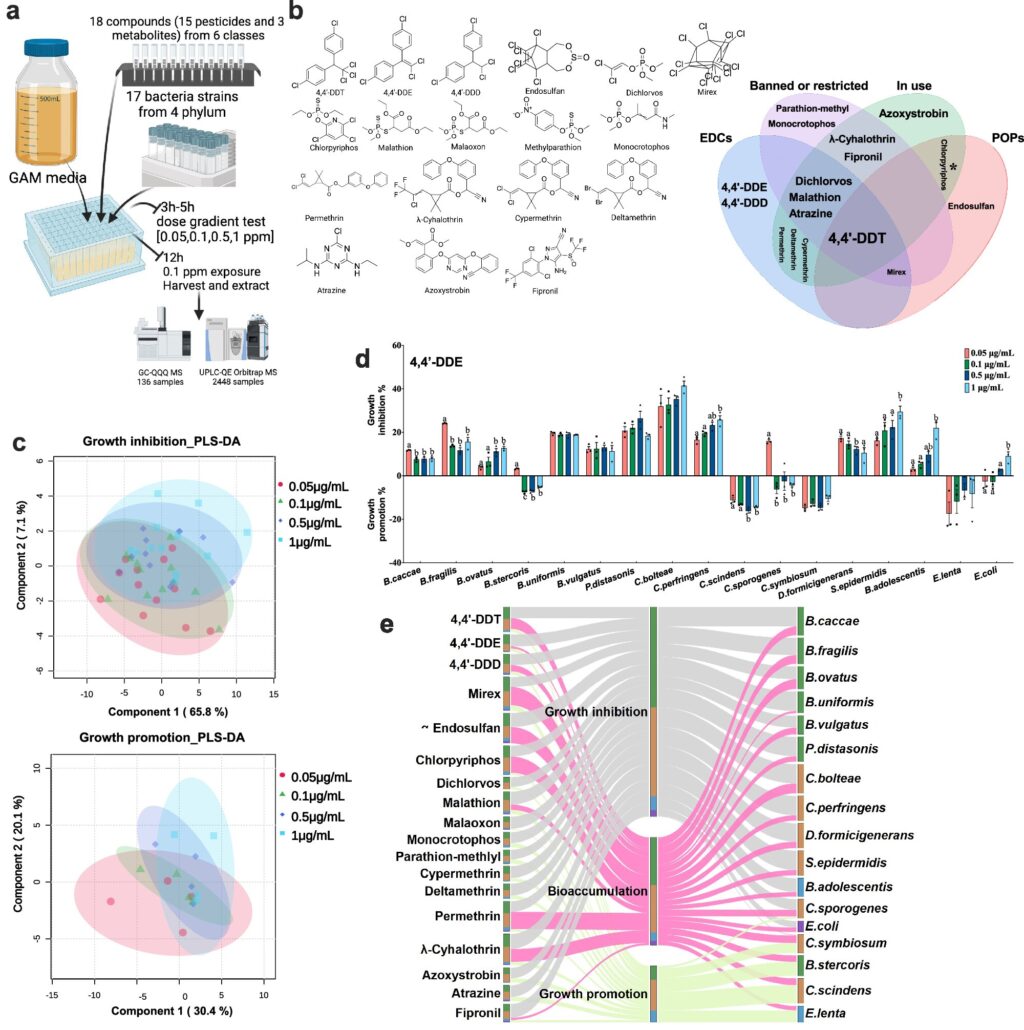
A groundbreaking study published in Nature Communications has unveiled a detailed atlas illustrating how pesticides interact with gut bacteria, potentially paving the way for probiotic interventions. Conducted by researchers at The Ohio State University, the study marks the first comprehensive mapping of changes in gut bacteria due to pesticide exposure, with findings that could influence future therapeutic strategies.
The research highlights that over a dozen pesticides can alter the growth patterns of human gut bacteria, affecting nutrient processing and accumulating within some bacterial species. These findings provide a new resource for targeted studies on diseases and therapeutic strategies, with the potential to mitigate some of the harmful health effects of pesticides.
Mapping the Microbial Impact of Pesticides
The study involved laboratory investigations and animal models to explore interactions between 18 commonly used agricultural pesticides and 17 species of gut bacteria. These bacteria are associated with either maintaining health or contributing to disease. Notable pesticides examined include DDT, atrazine, permethrin, and chlorpyrifos, some of which remain in the environment despite usage restrictions.
“We grew bacteria in culture and exposed them to relevant concentrations of pesticides to see how microbes responded to those pesticide exposures,” explained Li Chen, the study’s first author and a senior research associate in Jiangjiang Zhu’s lab. The team managed over 10,000 samples, developing a bacteria-pesticide interaction network that details how specific pesticides either promote or inhibit bacterial growth.
“Most previous environmental health studies reported that pesticide contamination affects the overall composition of gut bacteria,” said Chen. “We showed those pesticides really can affect specific gut bacteria and detailed how these changes will affect the general composition.”
Unveiling New Therapeutic Possibilities
Experiments in mice revealed that certain gut bacteria species might offer protection against pesticide toxicity, suggesting a potential probiotic approach to counteract inflammation and other harmful effects. Senior author Jiangjiang Zhu emphasized the significance of these findings for human health, noting the identification of microbes capable of degrading and clearing pesticides from biological systems.
“We’ve provided further understanding of how pesticides or environmental pollutants impact human health by modulating an important collection of microorganisms,” Zhu stated. The research opens the door to future therapeutic applications that could help detoxify the gut, improving health outcomes.
Metabolic and Lipid Analysis
The study also conducted a metabolic analysis of 306 pesticide-gut microbe pairs, examining how altered growth patterns and chemical accumulation affected metabolites. These molecular products play crucial roles in energy production and immune system activation. Additionally, the researchers focused on lipids, essential compounds produced by gut microbes that influence numerous body functions.
In mice, the introduction of Bacteroides ovatus after pesticide exposure led to changes in metabolic activity and lipid production, with some lipids inhibiting pathways linked to oxidative stress. This suggests that certain microbes might buffer the toxic effects of pesticides by modulating inflammation, a key factor in many diseases.
“We identified microbes that may modulate the toxic effect of pesticides to the host by somehow buffering the inflammation process,” Zhu explained, highlighting the potential for interventions that prevent larger-scale damage.
Future Directions and Collaborative Research
The research team plans to further explore the metabolic changes in gut microbes following pesticide exposure, aiming to understand their role in various health and disease conditions. Zhu anticipates that other scientists will build on this work, leveraging the atlas to investigate disease mechanisms and develop intervention strategies.
“We are mapping out this central interaction between pesticides and gut microbes,” Zhu said. “Other labs can leverage what we have discovered to predict targets or identify intervention strategies.”
Additional contributors to the study include researchers from Ohio State, Yale University, Zhejiang Academy in China, and Johns Hopkins University. The collaborative effort underscores the importance of interdisciplinary approaches in addressing complex environmental health challenges.
As the scientific community continues to unravel the intricate relationship between pesticides and gut bacteria, this study lays a foundation for future research and potential health interventions, highlighting the critical role of gut microbiota in maintaining human health.







